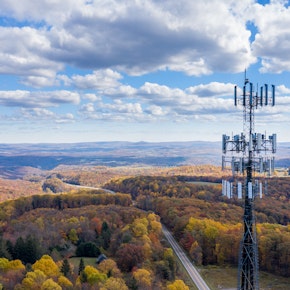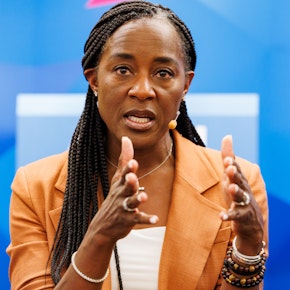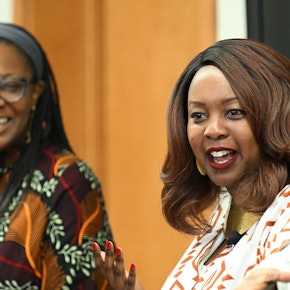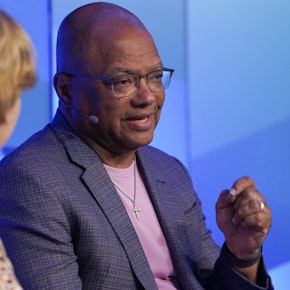Explore
Search results

An entire generation of children in some of the world’s poorest countries are now protected against deadly infectious diseases, thanks largely to Gavi: The Vaccine Alliance. Impact: more than 16 million lives saved, vast healthcare cost savings, and greater global health security. A leading force behind the push for equitable access to COVID-19 vaccines, Gavi has played a...

The pandemic has exposed long standing inequity when it comes to access and adoption of critical technologies, from broadband connections to laptops to digital literacy. These are the necessary conditions for children to learn, for young adults to acquire needed skills, for adults to find jobs, and to ensure everyone has access to the services they need. In this conversati...

One positive thing about COVID-19 is that it has forced us to reckon with significant structural weaknesses across our economy that touch most Americans. Small businesses — many run by people of color — are shutting down because access to capital is so fragmented. A financial system that doesn’t reach individuals, businesses, and communities where investment is in des...

Private equity firms are using leveraged buyouts, venture capital, and other funding sources to acquire hospitals, clinical practices, nursing homes, and other health-related businesses on a grand scale. In 2021, they poured more than $200 billion into the sector, compared to $41 billion in 2010. Investors claim their capital will expand access to care, drive innovation, f...

In the year plus since the murder of George Floyd and the global outcry for racial justice, much has changed in the world. And yet, systemic racism still casts its long shadow on many aspects of our lives. Join PayPal CEO Dan Schulman and Shartia Brantley to discuss the economic underpinnings of racial injustice and the investments that leaders across the ecosystem can mak...

Alongside climate adaptation, wealth inequality is one of America’s most urgent problems. Learn from a diverse group of innovators about their contributions and commitments to a more equitable wealth agenda and why they are hopeful substantive progress will be made.

Agriculture creates an astounding 23% of anthropogenic greenhouse gas emissions, which is just one of many significant problems with the industrial agricultural system in the United States. This session will shine a light on climate-smart agriculture practices and the people who develop, implement, and advocate for equitable solutions to a systemic crisis. We’ll hear how t...

No one is immune from the catastrophic storms, wildfires, heat waves, and drought that accompany climate change, but the risks are far greater for some populations than for others. Unstable housing, food insecurity, inadequate access to care, lack of tree canopy, and proximity to toxic emissions and other environmental hazards all intensify the health consequences. People...

In the fight against climate change, we’ll need to electrify everything we can: cars, stoves, trucks, heat pumps, and buildings. In the process, we’ll lower emissions and energy bills, make homes healthier, and build more resilient communities. But how do we electrify America so that every community reaps the far-reaching benefits?

In its landmark 2002 study, Unequal Treatment, the Institute of Medicine (IOM) stated bluntly that racial and ethnic minorities receive lower-quality health services than white Americans. Two decades after the IOM called out structural racism, the devastating toll remains apparent in the uneven risks associated with COVID, diabetes, asthma, cancer, stroke, and pregnancy. P...

Featured Ideas Festival Scholars include Lashon Amado, María Teresa Kumar, Michael McAfee, and Eshauna Smith. Fueling today’s highly charged political environment is the growing sense that opportunity is elusive and inequality is rising because our national economic policies unfairly disadvantage the middle class. Millions of Americans believe they’re pawns in a game they...

As the second largest minority group in the country, Latinos represent 19% of the population and play a significant economic, social, and cultural role. They also face disproportionate health challenges, including high rates of diabetes, obesity, hypertension, and cardiovascular disease. The absence of adequate health insurance, lack of timely access to care, language barr...

Inequitable and untimely responses to COVID-19 and other pandemics. Disproportionate health impacts of climate change in Africa. Unequal financing mechanisms. Lack of reliable data and information. A dearth of leadership guided by human-centered values. These are a few of the many challenges that stand in the way of global health and development systems that work for all....

The COVID-19 pandemic forced the world to grapple with a long-standing truth: that poor diversity in early and late stage medical research remains a major threat to health equity. Overcoming barriers and challenges to fair representation in research and development will not happen overnight, nor can it be achieved by a single institution. In order to pioneer lasting and su...

What is racial healing? This conversation between NBC News correspondent Yamiche Alcindor and the W.K. Kellogg Foundation’s La June Montgomery Tabron highlights the growing impact of racial healing and explores how this practice is at the heart of our journey to racial equity. We’ll candidly discuss recent headlines — the killing of George Floyd and the energy it mobilized...

Today, there is global demand for prosperity that is inclusive, sustainable, and fair. Growth without equity is no longer an acceptable outcome. Who is going to lead us into a future where growth and social equity go hand in hand? From the private sector to government to philanthropy and everywhere in between, women are driving change on new terms, with powerful results. J...

America’s robust biomedical ecosystem and the therapeutic advances it has introduced are making remarkable progress against cancer, heart disease, stroke, and other serious illnesses. But much more needs to be done to ensure that all communities can access the treatments and care they need. Prohibitive costs, ingrained biases, healthcare deserts, and distrust in the medica...

Untapped market opportunities, coupled with the recognition that many diseases exclusively affect women, or affect them differently than men, are drawing venture capitalists into women’s health. These private equity investors, often entrepreneurial women, are motivated by a commitment to gender equity, a supportive regulatory environment, and awareness that there are profi...

While internet connectivity, technology, and digital skills are central to every part of modern life, the unfortunate reality is that millions of Americans have been left behind. We’ll discuss how transformational investment in digital equity and inclusion is helping close the digital divide.

The past years have seen a tremendous mobilization of women, from #MeToo and Time’s Up to climate strikes and marches for political freedom. The potential to shift women’s political, economic, and social power is profound, so how will this activism be harnessed to fundamentally change our nation’s course? What is the agenda for women going into the 2020 elections? Hear fro...

